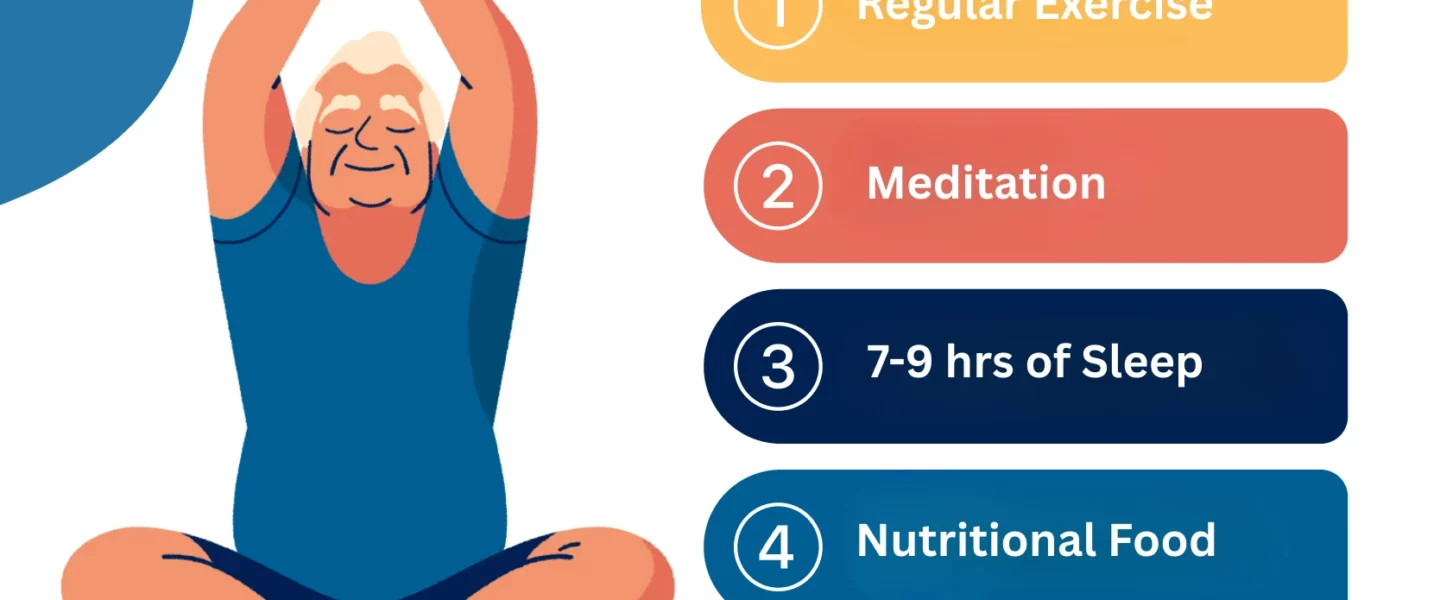April 14, 2025
Stress Management and Health | TrustyHealth’s Guide to Well-being

A lot of people feel stressed these days because life moves so quickly. While some worry can motivate us, but too much or long-term stress can be bad for our health. We at TrustyHealth think that knowing and dealing with stress are very important for staying healthy generally.
We think that long-term health and wellbeing depend on our ability to recognise and manage stress. This article will cover the definition, kinds, and symptoms of stress as well as the significance of stress management and health. We’ll also look at practical methods for lowering stress and enhancing general wellness.
What is Stress?
The body uses stress to fight predators and danger. The body floods with hormones to avoid or face danger. People call this the fight-or-flight mechanism. Humans react partially physically to threats.
The body activates resources to assist individuals in staying and facing the challenge or escaping quickly. The body creates more cortisol, adrenaline, and norepinephrine. These cause these bodily reactions:
1 Increased blood pressure
2 Heightened muscle preparedness
3 Sweating
4 Alertness
Types of Stress
Knowing the different kinds of stress can help you spot them and deal with them better:
- Acute stress: This is a short-term stress brought on by an impending obstacle or imagined danger. Among the examples are:
1 Taking a test
2 Speaking in front of an audience
3 Preventing an accident
Acute stress often passes rapidly and doesn’t have any lasting effects. There are instances when it can assist you stay focused and awake.
- Chronic Stress: This type of stress lasts longer and might come from continuous circumstances such as financial troubles, job demands, or poor relationships. If not handled, chronic stress may deplete the body and mind, hence causing major health issues. Chronic stress can deplete the body and mind, causing major health issues if not handled. This is the type of stress that we all must try to avoid.
- Acute Stress That Comes and Goes: Some people often suffer severe stress, usually from a hectic lifestyle or too many obligations. Irritability, anxiety, and tension follow from this tendency. This trend might cause anxiety, tension, and irritability.
- Eustress: Eustress is a type of stress that is not always negative. Eustress is a good kind of stress that may motivate people to work hard and reach their goals. Usually seen as a coping mechanism and doesn’t stay for long
Symptoms of Stress
Stress shows up in many forms and has effects on the body, feelings, and behaviour. Identifying these signs is the first step to successful treatment:
1 Headaches, tense muscles, tiredness, trouble sleeping, and stomach problems are some of the physical symptoms.
2 Anxiety, restlessness, lack of drive, anger, or sadness are some emotional symptoms.
3 Behavioral symptoms include eating too much or too little, losing your temper, abusing drugs, withdrawing from society, and working out less often.
If these signs don’t go away, they can lead to more serious health problems, like heart disease, diabetes, high blood pressure, and mental illnesses like anxiety and sadness.
How important it is to deal with stress
Stress management and health management are important to keep your mental and physical health in good shape. Stress that lasts for a long time can weaken the immune system, making it more likely to get sick. It can also make health problems worse and can cause bad ways to behave, such as emotional eating behavior or drug use. People can improve the quality of life, be more productive and can reduce the risk of health problems associated with stress by learning ways to cope with it.
Practice Self-Care
Numerous mental, physical, and emotional advantages of meaningful self-care can aid with stress management. Since everyone’s definition of self-care is different, strive to select activities that are most pertinent to you.
For example, spending some time to unwind, visiting friends, going for a bike ride or stroll, or rewatching your favourite TV show. What counts is that the action makes you feel good.
Tips for Dealing with Stress
At TrustyHealth, we support a comprehensive approach to stress control that includes a number of methods, such as
1 Regular Exercise: Working out lowers stress hormones and raises your happiness by releasing endorphins, which are natural chemicals that do this.
2 Mindfulness and Meditation: Deep breathing and meditation are two practices that can help you relax and deal with stress better.
3 Adequate Sleep: Getting enough rest helps the body heal and deal with stress better.
4 Healthy food: A well-balanced diet is good for your health and can make your body better able to handle stress.
5 Social Support: Spending time with family and friends can help you feel better and reduce stress.
6 Time management: Setting realistic goals and putting jobs in order of importance can help you avoid getting too busy and stressed.
Using these techniques can help you deal with stress better and improve your health.
The Stress Management Method Used by TrustyHealth
We at TrustyHealth are aware that everyone is impacted by stress in a unique way. Our holistic nutritional protocols and weight loss program are designed to help you address the possible impact of stress on your health and wellbeing. Through the use of journaling, we help you:
1 Determining the underlying reasons of stress (nutrition, lifestyle, and mental health)
2 Offering natural and holistic methods for stress management and health
3 Providing knowledgeable advice on mindfulness, diet, and general wellness
Feel free to check out our holistic nutritional protocols and weight loss program where we guide you with strategies to meet your long-term health objectives and lifestyle. (please link this back to the Functional Medicine page).
